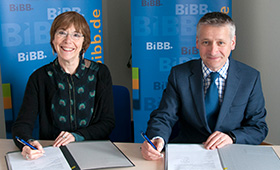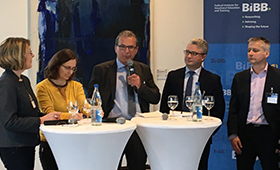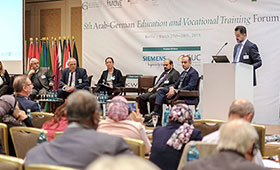
|
|||||||||||||||||||||||||||
|
|||||||||||||||||||||||||||
|
|||
|
The labour market in Germany is organised on the basis of the principle of the regulated occupation, and great significance is still accorded to vocational qualifications. But how successful are young people in entering working life after completing initial training? And -including in comparison to an academic qualification - what prospects do initial and advanced vocational education and training offer for future working life? The issue of BWP presents research results, company concepts and information on education and training provision. |
|||
|
Editorial: Vocational education and training - a stepping stone to successful career pathways Hubert Ertl, Prof. Dr., Director of Research and Vice President of BIBB This issue of BWP looks at transitions at the so-called "second threshold", i.e. from initial training to working life. It thus ties in with issue 1/2019, which focused on "first threshold" transitions from school to training. This threshold concept is certainly a valid object of debate in itself. VET research into the consequences of digitalisation has shown that change processes are gaining in momentum and that new requirements are constantly bringing about realignments in people's working lives. The articles included here also take account of this development. |
|||
|
Entry to the labour market after completion of qualification. How does integration into working life succeed? Ralf Dorau, Robert Herter-Eschweiler Germany has a low level of youth unemployment in international comparative terms. Practice-related (dual) training is often cited as a reason for this. But how do young people succeed in making the transition to the labour market and thus achieve integration into working life? This article uses data from the microcensus to analyse occupational integration approximately two years after successful completion of a vocational or higher education qualification. |
|||
|
What role does personality play? First results on occupational differences and wages from a recent BIBB survey Daniela Rohrbach-Schmidt, Christian Ebner The study of personality traits has received increasing attention in education and labour market research in recent years. Numerous studies show that personality exerts an independent influence on educational and labour market success. Against this background, a BIBB research project surveyed around 8,000 core employees from the BIBB/BAuA Employment Survey 2018 on their personality traits. Which personality structures and preferences exist in the current working population in Germany? Are there any differences in these structures between occupational groups? What significance do these characteristics have for labour market success? |
|||
|
Dual higher education study or advanced training - what increases the chances of career advancement? Tobias Maier, Stefanie Steeg Although the number of graduates with a bachelor's degree has risen over recent years, little information is available as to which position such persons assume within a firm and especially with regard to whether they vie for company advancement with those in possession of the formally equivalent qualifications of master craftsman, technician or certified senior clerk. This article presents the results of a company survey, which uses a choice experiment to identify possible competition for appointment to project management positions between persons who have completed advanced training and bachelor's programmes graduates (dual course of study). Read more Dual higher education study or advanced training - what increases the chances of career advancement? |
|||
|
Training occupation and current occupation - on professional and qualification matches Anja Hall, Ana Santiago Vela The current occupation does not always match the training occupation. Education-job match relates to the professional field or to the qualification level of the tasks carried out in the current occupation. If an occupational change has taken place, i.e. if training and current occupation are not the same, occupation-specific knowledge and skills may be lost, and the risk for overqualification may thereby be higher. Focusing on the relationship between training and current occupation, this article investigates whether, and to which extent, vocational education and training can enable women and men to do a job adequately matched to their qualification level. This also applies after an occupational change has taken place. The analysis bases on data from the BIBB/BAuA Employment Survey 2018. |
|||
|
|||
|
|
|||
|
|||
|
BIBB Data Report to accompany the 2019 Report on Vocational Education and Training is published Demand for training places by young people and young adults and the number of training places offered by companies both rose once again in 2018. Nevertheless, recruitment problems on the training market exacerbated further. These are the main outcomes of the 2019 BIBB Data Report. Read more The Federal Government's 2019 Report on Vocational Education and Training |
|||
|
|||
|
Silvia Annen This article investigates the issue of the extent to which migrants in Canada and Germany are able to use the qualifications and professional experiences they have acquired abroad on the domestic labour market. The information presented is based on case studies in the healthcare sector conducted in both countries. A related question is how the recognition process and the significance of occupational experience differ in the two countries and how these two aspects are determined. The results provide indications as to whether and in which ways the integration of foreign skilled workers in Germany and Canada can be improved. Read more Labour market integration of foreign skilled workers in Canada and Germany |
|||
|
|||
|
Germany and France pool expertise - Agreement on joint research projects
|
|||
|
Expertise from BIBB for a new Costa Rican Vocational Training Act
Read more Further information |
|||
|
|||
|
Cooperation between social partners and the state
Read more Further information |
|||
|
8th Arab-German Education and Vocational Training Forum: Demand meets supply
Read more Further information |
|||
|
How is the world of work reacting to technological change? TASKS V- Robotics, Artificial Intelligence and the Future of Work
Read more Further information |
|||
| Imprint | |
|
Bundesinstitut für Berufsbildung (BIBB) Friedrich-Ebert-Allee 114 – 116 Editorial Team:
|
|





